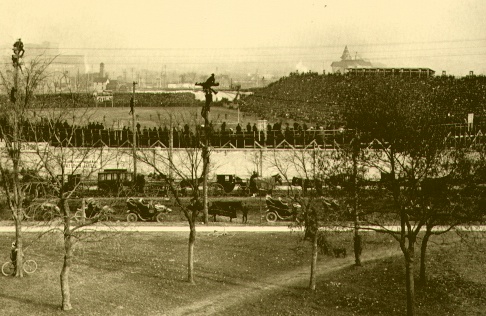|
Gopher Honors
1ST TEAM ALL-AMERICAN
James Walker, T, 1910
Bert Baston, E, 1915-1916
Shorty Long, QB, 1916
George Hauser, T, 1917
1ST TEAM ALL-BIG TEN
Bert Baston, E, 1915-1916
Bernie Bierman, FB, 1915
Merton Dunnigan, G, 1915
Conrad Eklund, G, 1916
George Hauser, 1917
Lisle Johnston, FB, 1910
Norman Kingsley, FB, 1918
Frank Mayer, T, 1916
John McGovern, QB, 1910
Clifford Morrell, C, 1911
Arnold Oss, HB, 1919
Reuben Rosenwald, HB, 1910-1911
Clark Shaughnessy, FB, 1913
Lorin Solon, E/FB, 1913-1914
James Walker, T, 1910
Pudge Wyman, FB, 1916
GOPHER HEAD COACHES
Dr. Henry L. Williams, 1910-1919
1910's Gopher Links
Gopher Scores, 1901-1920:
|

Minnesota Golden Gopher Football- the 1910's
Entering the new decade the Minnesota Gophers, under the
direction of Dr. Henry Williams, had firmly established
themselves as one of the true powers of college football.
Williams himself had earned his rightful place among the
game's great coaches and innovators, a list that included
Amos Alonzo Stagg, Glenn "Pop" Warner, and Fielding Yost.
The Gophers romped to a 6-1 record in 1910, tying for the
Western Conference Championship in the process. So dominant
was this team that it outscored its opponents 179-6, with
the 6 coming in a season-ending loss to Michigan, who was
temporarily out of the league.
They followed that performance with a 6-0-1 mark in 1911,
only this time they had the league title all to themselves.
As the years passed, the Gophers continued to win, taking
the league title in 1915, again with a 6-0-1 mark. So dom-
inant were the Gophers in the conference that the term
"Minnesota Monopoly" was being applied.
Williams' masterpiece was his 1916 team. With Pudge Wyman
throwing to Bert Baston, the Gophers had one of the greatest
passing attacks the game had ever seen. They slaughtered
their first four victims by a combined score of 236-14
and observers around the nation were acclaiming them the
finest football team in the game's history. But a huge 14-9
upset loss to Illinois, a 49-point underdog, ruined their
parade. The team would destroy Wisconsin and Chicago to
finish the season, but the damage had been done. There
would be no National Championship, nor even a conference
title, for a team considered by many to be the best ever to
step on a gridiron.
The Gophers would put together winning seasons for the rest
of the decade, despite the First World War, but it seemed
to many that the Williams era had reached its high-water
mark in 1916. The game was growing, and many fans feared
that the job of Gopher head coach could no longer be manned
by a "part-timer", even if that part-timer was a legend.

|

